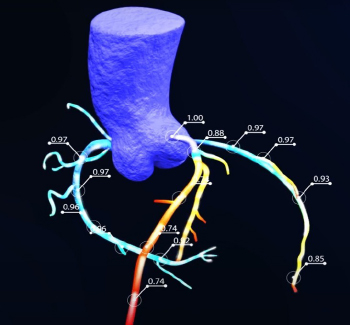
Keya Medical offers an opportunity to implement FFR CT in your practice. Our product, DEEPVESSEL FFR is accurate, economical, and easy to integrate into your workflow.
DEEPVESSEL FFR received FDA clearance in 2022 and has regulatory approvals for clinical use in the EU and China. DeepVessel FFR is increasingly used in practices around the world. Following is a sampling of recent peer-reviewed publications using Keya Medical’s FFR analysis and more studies with DEEPVESSEL FFR are in progress.
Coronary artery disease (CAD) affects approximately 18.2 million adults in the United States.[1] FFR CT has been integrated into the 2021 clinical guidelines by AHA/ACC/ASE/CHEST/SAEM/SCCT/SCMR [2], demonstrating its potential to improve clinical outcomes, enhance clinician productivity, improve care quality, and reduce healthcare costs with 33% [3]. The utilization of FFR CT has grown significantly, with CMS reimbursement contributing to an 11-fold increase in Medicare claims from 2018 to 2022.[4]
Recent Publications
Young man with chest pain and an abnormal echocardiogram
Peters M, Kalra D. Heart 2024;110:656-684.
A recent study by Dr. Dinesh Kalra highlights the optimization of care through the strategic combination of TTE, CCTA, and CT FFR analysis with DEEPVESSEL FFR.
Coronary Computed Tomography Angiography for the Assessment of Sirolimus-Eluting Resorbable Magnesium Scaffold.
Tonet, E.; Cossu, A.; Pompei, G.; Ruggiero, R.; Caglioni, S.; Mele, D.; Boccadoro, A.; Micillo, M.; Cocco, M.; De Raffele, M. et al. Life 2022.
In patients with resorbable magnesium scaffold (RMS) implantation, the study demonstrates that coronary computed tomography angiography (CCTA) with noninvasive fractional flow reserve (DEEPVESSEL FFR) is feasible and effective for long-term performance assessment, showing high scaffold patency and minimal adverse events over three years.
A stepwise strategy integrating dynamic stress CT myocardial perfusion and deep learning–based FFRCT in the work-up of stable coronary artery disease.
Lyu, L., Pan, J., Li, D. et al. Eur Radiol (2024)
FFR CT was performed with DEEPVESSEL FFR. The CCTA + FFR CT + CT-MPI stepwise strategy was superior to the CCTA + FFR CT and CCTA + CT-MPI approaches by minimizing unnecessary invasive diagnostic catheterization without compromising the agreement rate with ICA/FFR.
On-Site Computed Tomography–Derived Fractional Flow Reserve to Guide Management of Patients With Stable Coronary Artery Disease: The TARGET Randomized Trial.
Junjie Yang, Dongkai Shan, Yundai Chen, et al. Circulation. 2023.
On-site CT-FFR (DEEPVESSEL FFR) using machine learning reduced the proportion of patients with stable coronary artery disease but increased revascularization overall without improving symptoms or quality of life or reducing major adverse cardiovascular events.
Deep Learning–based Prediction of Percutaneous Recanalization in Chronic Total Occlusion Using Coronary CT Angiography.
Zhen Zhou, Yifeng Gao, Weiwei Zhang, et al. Radiology 2023.
Keya Medical participated in the study evaluating the accuracy of the Deep Learning (DL) prediction model. The DL model accurately predicted the percutaneous recanalization outcomes of CTO lesions and increased the efficiency of noninvasively grading the difficulty of PCI.
Value of CT‑derived fractional flow reserve in identifying patients with acute myocardial infarction based on coronary computed tomography angiography.
Yang F, Pang Z, Yang Z, et al. Exp Ther Med. 2023.
The study demonstrated that both ≤0.80 CT-derived fractional flow reserve (DEEPVESSEL FFR) and ≥70% coronary computed tomography angiography (CCTA) stenosis are independent risk factors for acute myocardial infarction (AMI). Combining these two measures significantly enhances the diagnostic accuracy for AMI compared to using either measure alone, providing a more robust model for distinguishing AMI from unstable angina in patients with obstructive coronary artery disease.
Impact of coronary computed tomography angiography-derived fractional flow reserve based on deep learning on clinical management.
Pan Y, Zhu T, Wang Y, Deng Y, et al. Front Cardiovasc Med. 2023.
This study revealed that most patients with ICA negative did not require further invasive FFR. Besides, some patients with mild to moderate coronary stenosis in ICA may also have functional ischemia. However, for severely calcified, occluded, or small coronary arteries, the treatment strategy should be selected based on ICA in combination with clinical practice. DEEPVESSEL FFR was used to calculate FFR CT.
1. What is coronary heart disease? National Heart, Lung, and Blood Institute. Updated December 20, 2023. Accessed August 25, 2023. https://www.nhlbi.nih.gov/health/coronary-heart-disease
2. Gulati M, Levy PD, Mukherjee D, et al. 2021 AHA/ACC/ASE/CHEST/SAEM/SCCT/SCMR guideline for the evaluation and diagnosis of chest pain: executive summary: a report of the American College of Cardiology/American Heart Association Joint Committee on Clinical Practice Guidelines. Circulation. 2021;144(22):e368-e454. doi:10.1161/CIR.0000000000001030
3. 1-year outcomes of FFRCT-guided care in patients with suspected coronary disease: the PLATFORM study. Douglas, P. S. et al. J. Am. Coll. Cardiol. http://dx.doi.org/10.1016/j.jacc.2016.05.057 (2016)
4. Anna Zink, PhD, Claire Boone, PhD, Karen E. Joynt Maddox, MD, MPHA, et al. rtificial Intelligence in Medicare: Utilization, Spending, and Access to AI-Enabled Clinical Software. Am J Manag Care. 2024;30(Spec Issue No. 6):SP473-SP477. https://doi.org/10.37765/ajmc.2024.89556
About DEEPVESSEL FFR
DEEPVESSEL FFR is a software medical device that uses deep learning technology to perform a non-invasive physiological functional assessment of the coronary arteries using coronary computed tomography angiography (CCTA). The software processes coronary CTA images semi-automatically, generates a three-dimensional model of the coronary artery tree, and estimates CT FFR values. DEEPVESSEL FFR is FDA-Cleared, CE-Marked, NMPA-Cleared, HSA-Certified.
About Keya Medical
Keya Medical is an international medical technology company developing deep learning-based medical devices for disease diagnosis and treatment. The company is committed to creating solutions that deliver clinical value at all stages in the patient care process, covering specialties including cardiology, neurology, pulmonology, pathology, and surgery. Keya Medical has four centers of excellence in Beijing, Shanghai, Shenzhen, and Seattle. Follow us on LinkedIn, Twitter, and Facebook.
Media Contact
contact@keyamedna.com
Learn more about DEEPVESSEL FFR
We are actively looking for clinical partners in the United States and EMEA.
